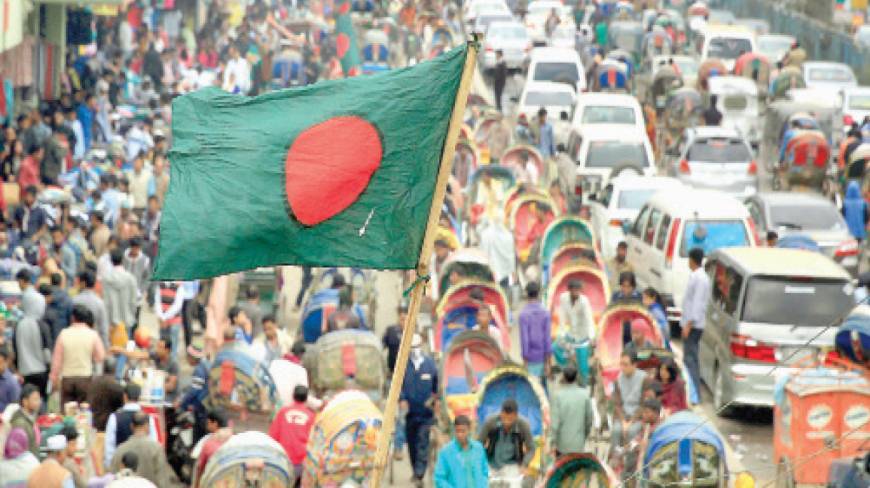The wealth of the country has grown, but oppression and exploitation are rampant. People hoped for life to be easier, but that has not happened
Bangladesh was born in 1971 after an unprecedented genocide that saw millions killed, hundreds of thousands of women raped, millions made orphans, people losing all their worldly possessions in the blink of an eye.
After Operation Searchlight was launched on March 25, 1971 as the West Pakistani tanks rolled on the streets of Dhaka, millions fled and the unlucky ones lay dead by the gutters. It is not only the minority Hindus who were targeted but the masses in general faced the barrel of a gun.
Indiscriminate slaughter of innocents resulted and the intelligentsia were in the process of getting wiped out. The Pakistani army found wiling cronies in certain die-hard believers of the failed dream of Pakistan and many of them were Bengalis themselves. These people were marked as collaborators. They have been tried for their crimes and then let go, after political upheaval in the state of Bangladesh changed personnel at the top tier of power. Their trials have started again recently.
The conflict created over 10 million refugees that fled to neighbouring India and an Indian offensive on East Pakistan became inevitable. The Bengalis, after the initial shock of the offensive launched by the marauding West Pakistanis, gathered themselves and started a guerilla warfare. The intention of gaining autonomy became an all out scream for independence. They were helped by the Indians.
From The Blood Telegram by Gary J Bass: “In London, the Sunday Times published a detailed and gruesome story by a Pakistani journalist, Anthony Mascarenhas, with the screaming headline GENOCIDE. Newsweek ran a horrific cover story. Village after village had been reduced to rubble, with stinking corpses.
The magazine said that a quarter of a million Bengalis had died. It told of a three-year-old child and his teenage mother, both of them refugees : They sat on the ground made muddy by the steady drizzle of the summer rains. The baby’s stomach was grotesquely distended, his arms no thicker than a man’s finger. His mother tried to coax him to eat some rice and dried fish. Finally, the baby mouthed the food feebly, wheezed — and died.”
Why did the Pakistanis (Western wing) run amok among the people of East Bengal? The Bengalis wanted autonomy (they won the elections of 1970 resoundingly), so the Pakistanis, with overt support from the Nixon administration, rolled tanks over them.
But as is obvious from history, the balance was not tilted in favour of the marauders and the Bengalis, with the Indian army in full support, forced the Pakistanis in the East Wing to surrender within nine months.
A new state was born in the world map: Bangladesh.
A new dawn was seen at the end of a long night of tyranny and people hoped. They hoped that the dawn would never end, it would never see the harsh sun of noon, the long and chilly night would never come. Alas, it was hope in vain; the world kept spinning on its axis.
The people of the landmass called Bangladesh fought in 1971 for their economic emancipation and freedom from exploitation by powers outside her boundaries. They fought not only to save their lives, but hoping for a country free from tyranny, a more equitable distribution of wealth, a country standing on the pillar of religious tolerance — call it secularism if you want; a country propagating socialistic ideals, not communism.
Over 40 years after that glorious moment of physical emancipation, what one sees is a dream that has remained a dream, turning to nightmares even, at times. A state religion has been inducted into the constitution which goes against the goals of the original constitution.
Bengalis were always a religious and God-fearing people, but religion was always a private matter. We have not seen that to be the case in a land that is fast losing tolerance for other faiths besides the one practiced by the majority. Politicians are flaunting their “holiness” by ostentatious display of their “piety.”
Deep down, mendacity is eating away the core of the country. A corrupt official or thieving minister is often seen going on holy pilgrimage with a bandwagon in accompaniment.
Equitable distribution is still a far cry. Some people, a small minority, have become fat cats and they have successfully created a plutocracy. The wealth of the country has grown, but oppression and exploitation are rampant. People hoped for life to be easier, but that has not happened; life is a struggle, unnecessary struggle it seems, for teeming millions. But they hope and struggle on.
People should want a lot more and not sit and hope. Whether they get what they hope for or want should not be a consideration; they should still want things to change. Anarchy should not be encouraged but accepting life as fate and lying down in defeat and thinking of better days, that may or may not come, cannot be the answer.
Good days need not be a mirage in the distance, but should seem somewhat palpable. People need to get at least some of what they want, a lot more than what they are getting now. The cats need some slimming down.
Bangladesh was a dream before inception but cannot remain a dream over four decades after coming into being. She will forge ahead, but things veer off in the wrong direction too often and that is not acceptable.
Rabindranath Tagore wrote: “What we want, we want in folly; what we get, we never wanted at all.”
Source: Dhaka Tribune

